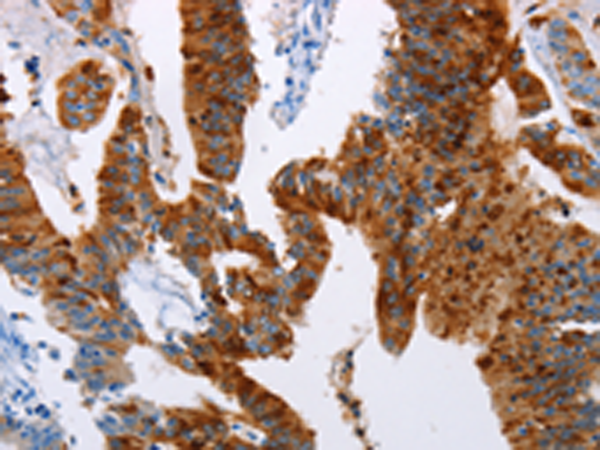
| WB | 咨询技术 | Human,Mouse,Rat |
| IF | 咨询技术 | Human,Mouse,Rat |
| IHC | 1/50-1/200 | Human,Mouse,Rat |
| ICC | 技术咨询 | Human,Mouse,Rat |
| FCM | 咨询技术 | Human,Mouse,Rat |
| Elisa | 1/2000-1/5000 | Human,Mouse,Rat |
| Aliases | ITF; P1B; TFI |
| Host/Isotype | Rabbit IgG |
| Antibody Type | Primary antibody |
| Storage | Store at 4°C short term. Aliquot and store at -20°C long term. Avoid freeze/thaw cycles. |
| Species Reactivity | Human |
| Immunogen | Fusion protein of human TFF3 |
| Formulation | Purified antibody in PBS with 0.05% sodium azide and 50% glycerol. |
+ +
以下是3篇关于TFF3抗体的代表性文献概览:
1. **《Trefoil factor 3 expression in colorectal cancer and its relationship to prognosis》**
- 作者:Taupin D, et al.
- 摘要:该研究通过免疫组化法(使用TFF3特异性抗体)分析结直肠癌组织中TFF3蛋白的表达水平,发现TFF3高表达与肿瘤侵袭性及患者不良预后显著相关,提示其可作为潜在的肿瘤标志物。
2. **《Development of a sandwich ELISA for quantification of human TFF3 in plasma》**
- 作者:Thim L, et al.
- 摘要:研究团队开发了一种基于TFF3单克隆抗体的夹心ELISA检测方法,用于定量人血浆中的TFF3浓度,验证了该方法在炎症性肠病诊断中的灵敏度和特异性。
3. **《TFF3 modulates mucosal repair by regulating cell migration through β-catenin signaling》**
- 作者:Soutto M, et al.
- 摘要:利用TFF3中和抗体阻断实验,揭示TFF3通过激活β-catenin信号通路促进肠道上皮细胞迁移,阐明其在黏膜损伤修复中的分子机制。
备注:以上内容为文献核心结论的概括,实际引用时建议通过PubMed或Web of Science核对原文详细信息(DOI或PMID)。若需更多文献类型(如治疗应用类),可进一步补充说明。
Trefoil factor family 3 (TFF3) is a small secretory protein primarily expressed by epithelial cells in the gastrointestinal tract, respiratory system, and other mucin-rich tissues. It belongs to the trefoil factor family, characterized by a conserved trefoil domain formed by six cysteine residues that stabilize its structure through disulfide bonds. TFF3 plays critical roles in mucosal repair, cytoprotection, and maintaining epithelial integrity. It promotes cell migration, inhibits apoptosis, and modulates inflammatory responses, making it essential for mucosal healing and barrier function. Dysregulation of TFF3 is implicated in conditions like inflammatory bowel disease (IBD), cancer, and mucosal injury.
TFF3 antibodies are immunological tools used to detect, quantify, or localize TFF3 in research and diagnostics. These antibodies, often monoclonal or polyclonal, enable studies of TFF3 expression patterns in normal vs. diseased tissues. In cancer research, TFF3 antibodies help investigate its dual role as a tumor suppressor or promoter, depending on context. Elevated TFF3 levels in colorectal, breast, or pancreatic cancers correlate with metastasis and poor prognosis, while its loss is linked to chronic inflammation. Clinically, TFF3 antibodies are utilized in immunohistochemistry (IHC) for tissue diagnostics and in ELISA for biomarker analysis in bodily fluids. Recent interest also focuses on their potential in therapeutic development, targeting TFF3 pathways to enhance mucosal healing or block oncogenic signaling. Validation of TFF3 antibodies ensures specificity for applications in basic research, disease mechanisms, and translational medicine.
×